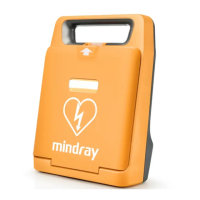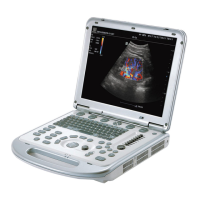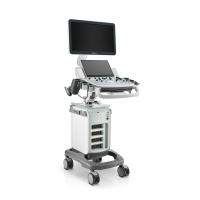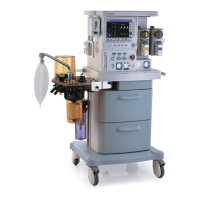7 3D/4D
Operator’s Manual 7 - 19
7.7 STIC (Spatio-Temporal Image Correlation)
Diagnoses made only by assessing this 3D/4D acquisition are not permitted.
Every diagnostic finding has to be evaluated in 2D as well.
STIC function provides sectional images of high spatial resolution as well as good time resolution,
which is mainly used in fetal heart observation and cardiac hemodynamic exams.
Acquired images are post processed to calculate a Volume Cine sequence representing one
complete heart cycle.
In order to achieve a good result, try to adjust the size of the volume box and the sweep angle to be
as small as possible. The longer the acquisition time, the better the spatial resolution will be.
The user must be sure that there is minimal movement of the participating persons (e.g., mother and
fetus), and that the probe is held absolutely still throughout the acquisition period.
Movement will cause a failure of the acquisition. If the user (trained operator) clearly recognizes a
disturbance during the acquisition period, the acquisition has to be cancelled.
• One or more of the following artifacts in the data set indicate a disturbance
during acquisition. In all of the following cases the data set has to be
discarded and the acquisition has to be repeated.
– Sudden discontinuities in the reference image B: These are due to
motion of the mother, the fetus or fetal arrhythmia during acquisition.
– Sudden discontinuities in the color display: Motion of the mother, the
fetus or fetal arrhythmia affects the color flow in the same way it affects
the gray image.
– Fetal heart rate far too low or far too high: After acquisition the
estimated fetal heart rate is displayed. If the value does not match the
estimations based on other diagnostic methods at all, the acquisition
failed and has to be repeated.
– Asynchronous movement in different parts of the image: e.g., the left
part of the image is contracting and the right part is expanding at the
same time.
– The color does not match the structure in the display format of grey
mode: The color displays above or beneath the actual vessels.
– Color “moves” through the image in a certain direction: This artifact is
caused by a failure in detecting the heart rate due to low acquisition
frame rate.
– Use higher acquisition frame rate for better result.
• It is not allowed to perform the STIC fetal cardio acquisition if there is
severe fetal arrhythmia.

